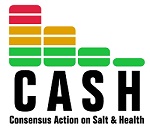Salt Awareness Week 2012
National Salt Awareness Week 26th March - 1st April 2012 will focus on salt reduction and the prevention of stroke.
Stroke is the third biggest killer in the UK and the leading cause of severe adult disability.
Salt reduction and stroke prevention has been selected as the topic for SAW 2012 because salt is the major factor that raises blood pressure and high blood pressure is the single most important risk factor for stroke - responsible for 62% of strokes.
Evidence also suggests that a high salt intake has a direct, ndependent effect on stroke. Salt is therefore responsible for many of the incidences of stroke. Reducing average salt intake by just 1g/day can prevent at least 2,600 deaths from stroke every year, plus the additional thousands of events that do not result in death.
I fully believe that people need to be aware of what is being put into the food they eat. CASH is doing such a brilliant and vital job of building awareness of the risk's of too much salt in our diet. We need to put pressure on the food industry to cut back on salt levels in processed food, and also take responsibility ourselves. Just simply cooking fresh meals will really help you control how much salt your having and CASH have a list of easy guidelines. Rock on CASH, you've got my support!
Caroline Artiss, TV Chef
I became especially interested in the levels of salt in food when my children, now age two and three, were being weaned.
It is incredible how quickly salt levels in our meals and snacks add up. Finding lower salt alternatives is not necessarily 'hard', but you do have to think about it.
I really have consciously cut back on salt in our family food over the last few years because laying good foundations from a young age is very important. I am pleased that CASH is highlighting the fact that simply reducing salt intake can reduce your risk of stroke. I urge everyone to think about their own diet and how they can lower theirs. It doesn't mean that you have to consign yourself and your family to 'tasteless' food and ban everything that is processed.
Once you get in to the swing of things and swap to lower salt breakfast cereals, breads and baked beans for example, and use naturally salt free options like potatoes, pasta and rice at meals, your taste-buds quickly adjust. With the use of herbs, lemon juice, vinegar's and spices, home cooked meals can be packed full of delicious flavours, which everyone can enjoy.
Amanda Ursell, Nutritionist, Dietitian & award winning journalist

Raising awareness of how salt can seriously affect our health is of the utmost importance especially for children, as putting too much salt in our food is a habit we can develop at a very young age.
If we secure this message to children NOW, the health of future generations will be positively affected.
Katy Ashworth, CBBC presenter